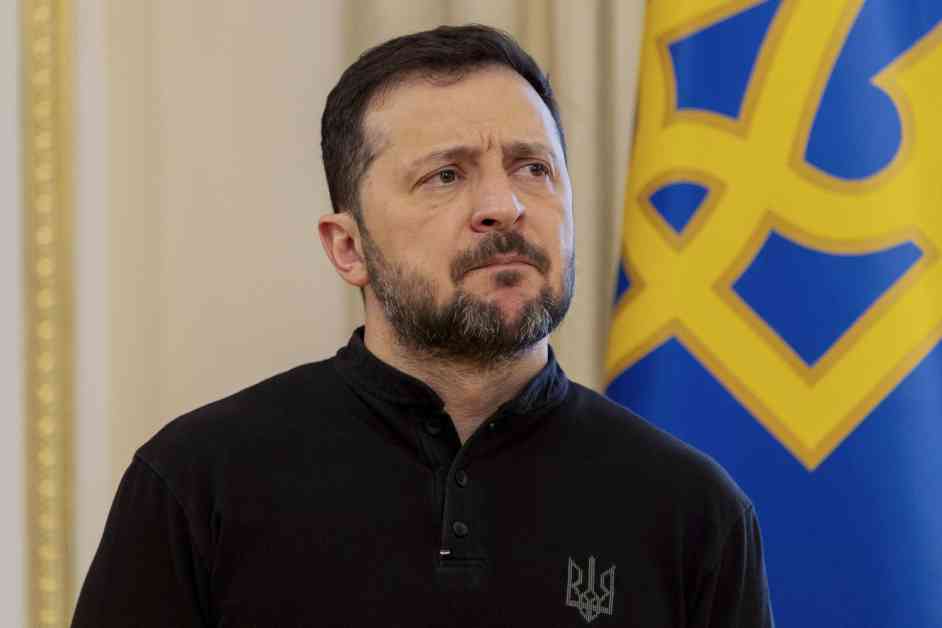Ukrainian President Volodymyr Zelenskyy made a bold statement during a government forum in Kyiv, marking the three-year anniversary of Russia’s invasion of Ukraine. Zelenskyy expressed his willingness to step down from his presidency if it meant achieving lasting peace for his country and securing membership in the NATO military alliance. In response to a journalist’s question about potentially trading his office for peace, Zelenskyy stated, “If to achieve peace, you really need me to give up my post, I’m ready. I can trade it for NATO.”
Zelenskyy’s remarks came amidst recent suggestions by US President Donald Trump and Russian President Vladimir Putin regarding holding elections in Ukraine, despite the country’s legislation prohibiting them during martial law. The timing of Zelenskyy’s statement coincided with a significant increase in Russian drone strikes on Ukrainian territory, with the Ukrainian president highlighting the scale of the attacks on social media. He reported that 267 strike drones had been deployed in what he described as “the largest attack since Iranian drones began hitting Ukrainian cities and villages.”
The Ukrainian air force confirmed that 138 drones had been intercepted and shot down across 13 Ukrainian regions, with an additional 119 drones failing to reach their intended targets. In addition to the drone strikes, three ballistic missiles were launched, resulting in casualties including one fatality in the city of Kryvyi Rih. The gravity of the situation was underscored by Putin’s televised address on Russia’s Defender of the Fatherland Day, which preceded the anniversary of the invasion of Ukraine. Putin commended Russian soldiers for their defense of the nation’s interests and vowed to provide increased support and resources to the military.
Escalating Tensions and Ongoing Conflict
The escalating tensions between Ukraine and Russia have been a source of concern for the international community, with the conflict showing no signs of abating. The three-year anniversary of Russia’s invasion of Ukraine serves as a grim reminder of the ongoing hostilities and the human cost of war. Zelenskyy’s willingness to sacrifice his presidency for the prospect of peace and NATO membership reflects the high stakes involved in the conflict and the urgent need for a resolution.
Expert analysts have pointed to the strategic implications of Ukraine’s potential NATO membership, which could shift the balance of power in the region and impact global security dynamics. The role of international actors, including the United States and Russia, in the conflict continues to shape the trajectory of events on the ground. As the situation remains fluid, diplomatic efforts and negotiations are crucial to preventing further escalation and finding a sustainable resolution to the crisis.
Humanitarian Impact and Civilian Casualties
Amidst the military maneuvers and political posturing, the humanitarian impact of the conflict cannot be overlooked. Civilian casualties, like the tragic loss of life in Kryvyi Rih, underscore the human toll of war and the need for urgent humanitarian assistance. The use of advanced weaponry, such as drones and ballistic missiles, raises concerns about the indiscriminate nature of modern warfare and the challenges of protecting non-combatants in conflict zones.
International organizations and humanitarian agencies play a vital role in providing aid to affected populations and advocating for the protection of civilians in conflict zones. The stories of individuals impacted by the conflict, from displaced families to injured civilians, highlight the urgency of addressing the humanitarian crisis in Ukraine. As the conflict continues to unfold, efforts to mitigate the suffering of vulnerable populations and uphold international humanitarian law are essential for promoting peace and stability in the region.
In conclusion, the situation in Ukraine remains volatile, with ongoing military operations, diplomatic tensions, and humanitarian concerns shaping the evolving landscape of the conflict. The willingness of leaders like Zelenskyy to make personal sacrifices for the greater good underscores the complexity and gravity of the crisis. As the international community grapples with the challenges of resolving the conflict, the voices of ordinary Ukrainians and the human cost of war must remain at the forefront of efforts to achieve lasting peace and security in the region.












